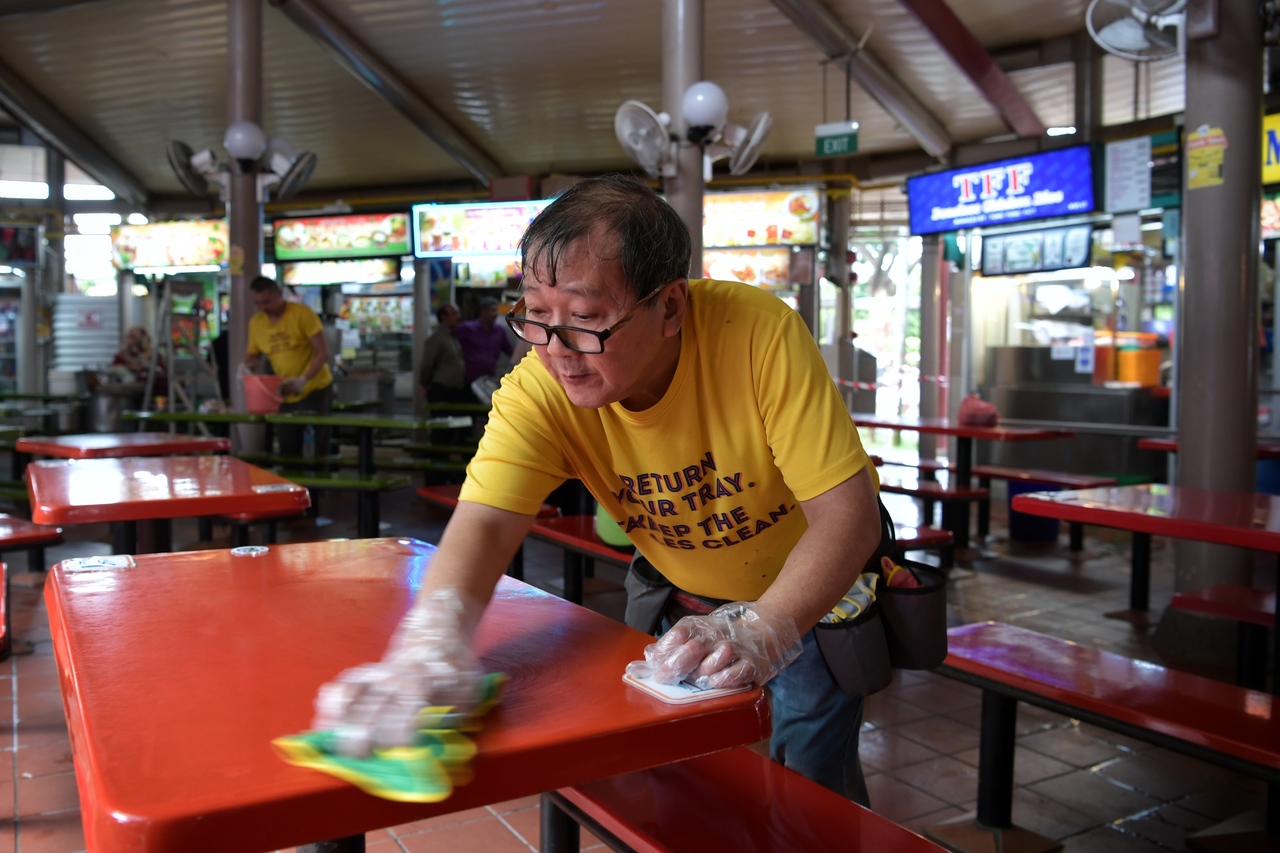Parliament: Mandatory cleaning standards for hawker centres, schools and eldercare centres from next year
Sign up now: Get ST's newsletters delivered to your inbox

Hawker stalls that have met certain cleanliness requirements - such as ensuring food preparation areas and equipment are sanitised and waste is properly handled - are awarded an SG Clean quality mark.
PHOTO: ST FILE
SINGAPORE - Hawker centres, schools, childcare facilities and eldercare centres are among the premises that will have to undergo compulsory cleaning at prescribed minimum frequencies under new rules announced on Wednesday (March 4).
They come as the Covid-19 outbreak, in addition to a spate of gastroenteritis cases last year, underscore the importance of public hygiene.
"Cleanliness and hygiene is a first line of defence against evolving public health threats," Senior Minister of State for the Environment and Water Resources Amy Khor told the House on Wednesday.
"We do not know how long Covid-19 will last. We are entering a new situation where enhanced personal hygiene habits and social responsibility have to be an integral part of our lives," she added.
The amendment to the Environmental Public Health Act will hold owners responsible for the cleanliness of their spaces.
They will have to set out an environmental sanitation programme listing areas to be cleaned and disinfected at regular intervals, including commonly neglected "back-of-house" spaces such as bin centres, refuse holding areas and loading and unloading bays.
Owners will have to appoint a person to develop and monitor the sanitation programme, provide advice on remedial actions when necessary as well as keep cleaning and disinfection records.
The National Environment Agency (NEA) said separately that the new requirements will be implemented progressively, starting with premises with high footfall and vulnerable occupants such as children and the elderly.
The agency launched the SG Clean initiative last month to raise public hygiene standards amid the coronavirus outbreak, starting with hawker centres.
Hawker stalls that have met certain cleanliness requirements - such as ensuring food preparation areas and equipment are sanitised and waste is properly handled - are awarded an SG Clean quality mark. Hawker centres are also given the quality mark for meeting hygiene standards in aspects such as toilet cleanliness and general public hygiene, like pest management.
Said Dr Khor: "SG Clean seeks to turn the current crisis into an opportunity, by uplifting the standards of public hygiene and sustaining them."
"It is to be a whole-of-nation movement to instil a national 'keep clean culture' for the long term, beyond the battle with Covid-19," she added.
The NEA pointed out that the multiple incidences of gastroenteritis that affected pre-schools in 2018 highlighted the need for improvements to cleaning standards.
It noted that as various sectors would have different needs, the cleaning standards and requirements would vary under the new Act. The agency added that it would "calibrate the requirements to minimise compliance costs" for premises' managers.
The Singapore Food Agency (SFA) has also put in place a slew of measures, including stepping up efforts in food safety monitoring.
Food establishments serving vulnerable groups such as children and the elderly will be required to keep retention samples that will be used to assist with investigations in the case of a gastroenteritis outbreak.
All food establishments that are licensed to provide catering services will also be required to install closed-circuit television (CCTV) cameras at food handling areas.
These will allow food businesses to better monitor their operations and encourage food handlers to comply with safety and hygiene regulations, said the SFA.
The agency will also enhance the training framework for food hygiene officers to better equip them in their roles and help them upgrade their skills.
It is estimated that 9,000 new and existing food hygiene officers and 400 advanced officers will be trained over the next 10 years, said Dr Khor.
In 2022, food handlers at non-retail food establishments must also pass the Basic Food Hygiene Course, which covers topics such as personal hygiene, proper food handling and storage. Only food handlers at retail food establishments now have to complete the course.
Dr Khor also announced that about 14,000 hawkers will receive a 50 per cent waiver of their stall rental fees this month, the first of three waivers in the wake of the coronavirus outbreak.
They will receive a 25 per cent rental waiver in April, and a further 25 per cent in May.
The one-month rental waiver, with a minimum sum of $200, is expected to help tenants of 114 hawker centres offset the hit from reduced footfall.


